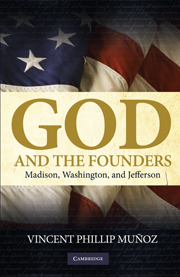Book contents
- Frontmatter
- Contents
- Acknowledgments
- Introduction: The Founders, Religious Freedom, and the First Amendment's Religion Clauses
- PART I THE FOUNDERS' CHURCH-STATE POLITICAL PHILOSOPHIES
- 1 James Madison's Principle of State Noncognizance of Religion
- 2 George Washington on Church and State: Religion and the Civic Good
- 3 Thomas Jefferson's Natural Rights Philosophy and Anticlerical Politics of Religious Liberty
- PART II THE FOUNDERS AND FIRST AMENDMENT RELIGION CLAUSES
- Conclusion: The Founders and Church-State Jurisprudence
- Appendix A “Memorial and Remonstrance against Religious Assessments” by James Madison, 1785
- Appendix B A Bill “Establishing a Provision for Teachers of the Christian Religion” by Patrick Henry, 1784
- Appendix C A Bill for Establishing Religious Freedom in Virginia by Thomas Jefferson, 1777
- Index
1 - James Madison's Principle of State Noncognizance of Religion
Published online by Cambridge University Press: 05 June 2012
- Frontmatter
- Contents
- Acknowledgments
- Introduction: The Founders, Religious Freedom, and the First Amendment's Religion Clauses
- PART I THE FOUNDERS' CHURCH-STATE POLITICAL PHILOSOPHIES
- 1 James Madison's Principle of State Noncognizance of Religion
- 2 George Washington on Church and State: Religion and the Civic Good
- 3 Thomas Jefferson's Natural Rights Philosophy and Anticlerical Politics of Religious Liberty
- PART II THE FOUNDERS AND FIRST AMENDMENT RELIGION CLAUSES
- Conclusion: The Founders and Church-State Jurisprudence
- Appendix A “Memorial and Remonstrance against Religious Assessments” by James Madison, 1785
- Appendix B A Bill “Establishing a Provision for Teachers of the Christian Religion” by Patrick Henry, 1784
- Appendix C A Bill for Establishing Religious Freedom in Virginia by Thomas Jefferson, 1777
- Index
Summary
We maintain therefore that in matters of Religion, no man's right is abridged by the institution of Civil Society, and that Religion is wholly exempt from its cognizance.
James Madison, “Memorial and Remonstrance” (1785)No man is more responsible for the Constitution than James Madison. Leading delegate at the Philadelphia Convention, advocate and expositor as Publius, author and sponsor of the Bill of Rights: Madison rightfully earned his title “Father of the Constitution.” Along with Thomas Jefferson, he also played the leading role in Virginia's battle for religious freedom, authoring in the process his landmark statement on religious liberty, “Memorial and Remonstrance Against Religious Assessments.” It should be no surprise, then, that along with Thomas Jefferson, Madison has been considered an authoritative guide to the meaning of the First Amendment's religion clauses. The meaning of the “Memorial,” however, is a matter of significant dispute. Strict separationist judges and scholars claim that Madison partnered with Jefferson to erect a “wall of separation” between church and state, thereby prohibiting all governmental support for religion. Nonpreferentialists challenge this interpretation, contending that, regardless of Jefferson's aims, Madison meant only to prevent the state from favoring one religious sect over others. The state may support religion, they claim, so long as it supports all religions equally. For Free Exercise cases, Madison has been invoked to defend the right to religious exemptions from facially neutral but burdensome laws.
- Type
- Chapter
- Information
- God and the FoundersMadison, Washington, and Jefferson, pp. 11 - 48Publisher: Cambridge University PressPrint publication year: 2009

